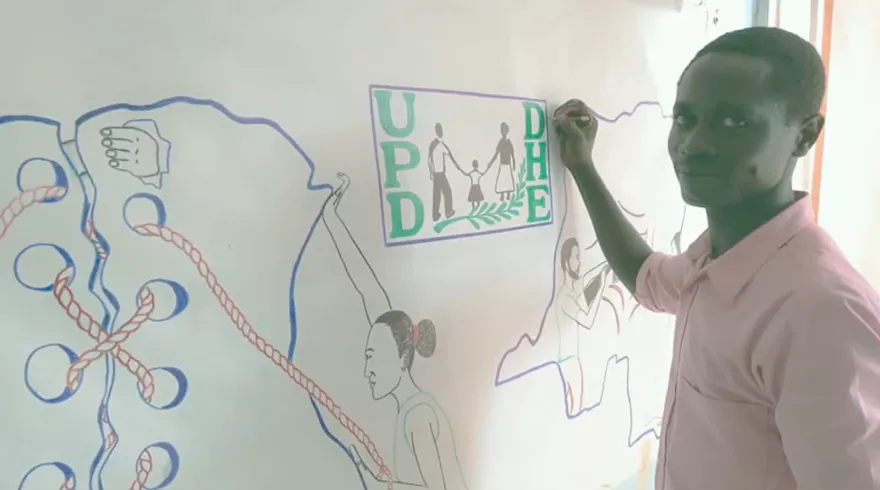
Change maker: Localisation
Méschac Nakanywenge, Union for Promotion Protection, Human Rights Defense and the Environment / DRC
I am Méschac Nakanywenge, coordinator of the UPDDHE, which is the Union for the Promotion or Protection, the Defense of Human Rights and the Environment created in 2010 and started the actual activities in 2013. Our headquarters is in the east of the Democratic Republic of Congo in the city of Goma, North Tibou Province.
To be part of the humanitarian world, you need a certain amount of experience. The experience that we had, that had helped me the most was a project supported by the Start Network, where I had done a training course. During the nine months, I had done management and leadership [training] where I learned about the humanitarian world, how to be accountable to the beneficiary communities and how to do this job better. I am so grateful and even our organisation has benefited from the training aids. To this day, it remains an asset that we can never forget.
For the DRC, these training courses are not open to everyone because there is not a state budget or a state structure that takes care of this to help us take humanitarian action. It is up to each person to focus on his or her vision and each person to find the opportunities that are open to him or her to immerse themselves in the humanitarian world.
It is thanks to Start Network that I learned about the existence of the Charter for Change. And I have since integrated the Charter for Change [into our work]. When we initiated it in the DRC, people had come to the Charter for Change meetings thinking that we had received funding from a partner, and after three of four meetings, there was no funding. Many disassociated themselves from this initiative [waiting to] see if the eight commitments of the Charter for Change were respected. Every day, I keep sharing with social networks. When we got discouraged because we went two years, three years, four years without funding, I ask for perseverance. Because what does humanitarian work mean? Humanitarian work is not a business, but humanitarian work is helping a person in a dangerous and vulnerable situation.
[A representative] from Start Network came here to Goma in 2018 and 2019. They organised workshops and we participated in several activities. In particular, we produced a report on the danger for us people living in Goma and the volcano aspect, how to prevent people from being in danger if there is a volcanic eruption, and what are the strategies we can develop to alert local people in time.
I am grateful to the Start Network and I have already participated in five project selection panels when the member organisations of this network intervene in the DRC for an emergency intervention. I have already chaired more than three panels and more than five times I have participated and even participated in other panels. The objective is to promote local capacities and to put more emphasis on local affairs.
We who were born in this area of eastern DRC saw how the wars started since 1995, we saw the challenges that our communities have been facing. Sometimes we face terrible difficulties, sometimes we arrive in areas where we don't have access to communication, you don't have access to road infrastructures you are forced to walk in the rain in situations where you pass through armed groups that are without morals, without instructions and without a spirit, but you tell yourself that you are coming to help someone who is in difficulty.
Our state is focused on politics, but little importance is given to the humanitarian aspect, so we find ourselves in a situation where we don't have partners who finance us. We tell ourselves we can do it on our own, with our own initiatives, and it's when things are going badly and others say that we should look for a job elsewhere that we resist and help someone who is in difficulty. This is the verdict.
This article is based on an interview conducted by A Good Day in Africa. Listen to the full interview below.

